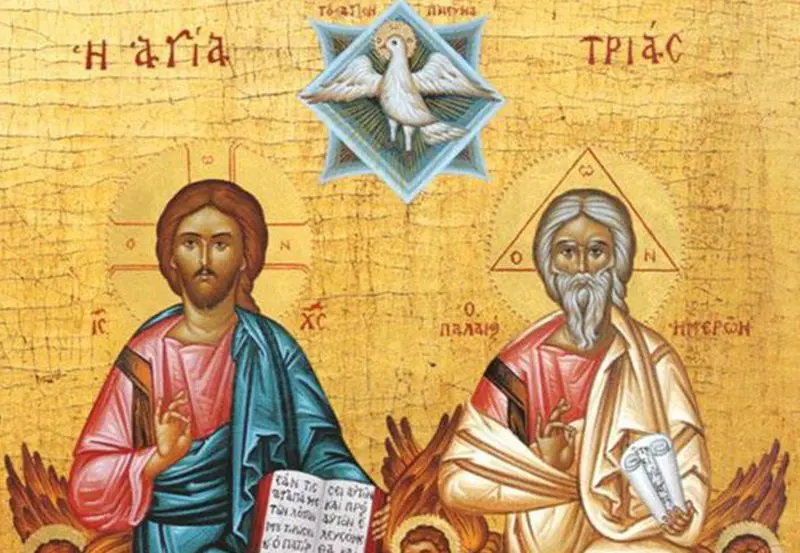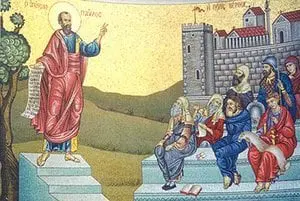Compilation by St. Bishop Theophan, the Recluse of Vysha
St. Gregory of Nyssa:
“Who would give me dove’s wings?” – said the psalmist David (Ps. 54:7). I dare to say the same: who would give me those wings, so that I could raise my mind to the height of these words, and, leaving the earth, pass through the air, reach the stars and see all their beauty, but without stopping and to them, beyond all that is movable and changeable, to reach the constant nature, the immovable power, guiding and sustaining all that has being; all that depends on the ineffable will of God’s Wisdom. Moving mentally away from that which is changeable and perverse, I will for the first time be able to unite mentally with the Immutable and the Unchangeable, and with the closest name, by saying: Father!”.
St. Cyprian of Carthage:
“Oh, what a condescension towards us, what an abundance of favor and kindness from the Lord, when He allows us, when performing the prayer before the face of God, to call God the Father, and to call ourselves sons of God, just as Christ is the Son of God! None of us would dare to use that name in prayer if He Himself had not allowed us to pray in this way.
St. Cyril of Jerusalem:
“In the prayer that the Savior taught us through His disciples, we name God the Father with a clear conscience, saying: “Our Father!”. How great is God’s humanity! Those who have fallen away from Him and who have reached the extreme limit in evil are given such a communion in grace that they call Him Father: Our Father!”.
St. John Chrysostom:
“Father ours! Oh, what extraordinary philanthropy! What a high honor! In what words shall I give thanks to the Sender of these goods? See, beloved, the nothingness of your nature and mine, look into its origin – in this earth, dust, mud, clay, ashes, because we are created from the earth and finally decay into the earth. And when you imagine this, marvel at the unfathomable wealth of God’s great goodness to us, by which you are commanded to call Him Father, earthly – Heavenly, mortal – Immortal, perishable – Incorruptible, temporal – Eternal, yesterday and before, existing ages ago’.
Augustine:
“In every petition, the favor of the petitioner is first sought, and then the substance of the petition is stated. A favor is usually requested with praise of the one from whom it is requested, which is placed at the beginning of the request. In this sense, the Lord also commanded us at the beginning of the prayer to exclaim: “Our Father!”. In the Scriptures there are many expressions through which the praise of God is expressed, but we do not find a prescription for Israel to be addressed as “Our Father!”. Indeed, the prophets called God the Father of the Israelites, for example: “I brought up and raised sons, but they rebelled against me” (Is. 1:2); “If I am a father, where is the honor to Me?” (Mal. 1:6). The prophets called God thus, apparently to expose the Israelites that they did not want to be sons of God because they had committed sins. The prophets themselves did not dare to address God as the Father, since they were still in the position of slaves, although they were destined for sonship, as the apostle says: “the heir, while he is young, is not distinguished by anything from a slave” (Gal. 4:1). This right is given to the new Israel – to the Christians; they are destined to be children of God (cf. John 1:12), and they have received the spirit of sonship, which is why they exclaim: Abba, Father!” (Rom. 8:15)”.
Tertullian:
“The Lord often called God our Father, he even commanded us not to call anyone on earth Father except the One whom we have in heaven (cf. Matt. 23:9). Thus, by addressing these words in prayer, we fulfill the commandment. Blessed are those who know God their Father. The name of God the Father has not been revealed to anyone before – even the questioner Moses was told another name of God, while it is revealed to us in the Son. The very name Son already leads to the new name of God – the name Father. But He also spoke directly: “I have come in the name of the Father” (John 5:43), and again: “Father, glorify Your name” (John 12:28), and even more clearly: “I have revealed Your name to men ” (John 17:6)”.
St. John Cassian the Roman:
“The Lord’s Prayer presupposes in the person who prays the most exalted and most perfect state, which is expressed in the contemplation of the One God and in ardent love for Him, and in which our mind, permeated by this love, converses with God in the closest communion and with special sincerity, as with his Father. The words of the prayer suggest to us that we should diligently long for the attainment of such a state. “Our Father!” – if in such a way God, the Lord of the universe, with His own mouth confesses His Father, then at the same time He also confesses the following: that we have been completely raised from a state of slavery to a state of adopted children of God.
St. Theophylact, archbishop. Bulgarian:
“Christ’s disciples competed with John’s disciples and wanted to learn how to pray. The Savior does not reject their desire and teaches them to pray. Our Father, who art in heaven – notice the power of prayer! It immediately elevates you to the sublime, and inasmuch as you call God the Father, you convince yourself to make every effort not to lose the likeness of the Father, but to resemble Him. The word “Father” shows you with what goods you have been honored by becoming a son of God”.
St. Simeon of Thessaloniki:
“Father ours! – Because He is our Creator, who brought us from non-being into being, and because by grace He is our Father through the Son, by nature He became like us”.
St. Tikhon Zadonsky:
“From the words “Our Father!” we learn that God is the true Father of Christians and they are “sons of God through faith in Christ Jesus” (Gal. 3:26). Therefore, as our Father, we should confidently call upon Him, as the children of carnal parents call upon them and extend their hands to them in every need.”
Note: St. Theophan, the Recluse of Vysha (January 10, 1815 – January 6, 1894) is celebrated on January 10 (January 23 old style) and on June 16 (Transferring the relics of St. Theophan).







